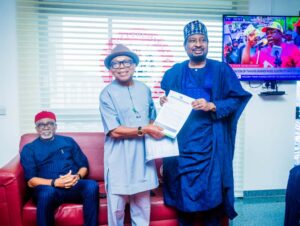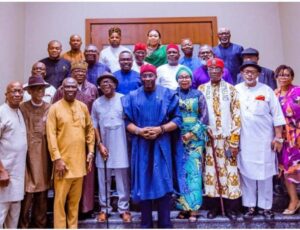Photo: Chief Theo Nkire presents the request for Aba State to the Hon. Benjamin Okezie Kalu, Deputy Speaker of the House of Representatives.
By Our Reporter
Stakeholders, including the Aba State Movement and Ohanaeze Ndigbo, have reiterated the reasons why Aba State should be the sixth state that will be created in the South East.
The reasons for the creation of Aba State, a long-held aspiration, also re-echoed recently when a high-powered delegation reinforced its case to the Senate Committee, chaired by Senator Barau Jibrin.
The delegation reiterated that the establishment of Aba State is not merely a desire but a “long-overdue correction” and a “historical necessity.”
 *Chief Theo Nkire presents documents proposing Aba State to Distinguished Senator Barau Jibrin, Deputy Senate President. Senator Enyinnaya Abaribe is seated.
*Chief Theo Nkire presents documents proposing Aba State to Distinguished Senator Barau Jibrin, Deputy Senate President. Senator Enyinnaya Abaribe is seated.
“Aba State has been designated as the sixth state to be created in the South East by Ohanaeze Ndigbo. The first approval for its creation was granted in 2015, and again in 2018”, according to the Aba State Movement.
In a statement issued on Sunday night, the Aba State Movement recalled that a 2015 committee formed by Ohanaeze Ndigbo, the apex socio-cultural organisation of the Ndigbo, recommended only Aba State for creation. Another Ohanaeze committee in 2018 overwhelmingly reaffirmed this recommendation.
“Ohanaeze Ndigbo committees selected Aba as the proposed sixth state for the South East ten years ago and reaffirmed it seven years ago,” stated the announcement signed by His Royal Highness Eze Love Nwogu, Chairman of the Aba State Movement, and Secretary-General Chief G. I. Akara.
The demand for Aba State dates back even further. “The proposal for the creation of Aba State was submitted to the National Assembly in 1982. On June 16, 1983, the National Assembly recommended a referendum for its creation (See National Assembly Debate, First Assembly, Vol. 3, No 24).
However, the military takeover on December 31, 1983, truncated the referendum. Other states recommended for creation in 1983 alongside Aba, including Adamawa, Jigawa, Katsina, Kogi, Taraba, and Enugu, have all been established, leaving Aba still without recognition,” the statement revealed.
The unique features of the proposed Aba State include the homogeneity of the communities advocating for its creation, the two prior approvals from Ohanaeze Ndigbo committees, and the National Assembly’s earlier approval for a referendum on Aba State in June 1983 (which was interrupted by military intervention).
Additionally, there is geographical contiguity among the proposed areas, unaltered boundaries throughout decades of demand for Aba State, and the fact that nearly every family in the South East has a connection to Aba and its proposed territory.
 *Hon. Kalu meets with the visiting delegation advocating for Aba State.
*Hon. Kalu meets with the visiting delegation advocating for Aba State.
Further reasons for creating Aba State, as outlined in the statement, include its economic viability based on a vast array of resources, including agriculture (Aba was the epicentre of the palm oil belt that sustained the economy of the former Eastern Region), commerce and industry, and oil and gas assets.
The uninterrupted electricity supply from Geometric to all parts of the proposed Aba State is expected to accelerate industrialisation. The region also boasts a massive workforce, backed by the community’s hard work and innovation utilising indigenous technology.
The Aba State Movement continues to advocate its case at the National Assembly and engage with other stakeholders as the journey toward realising Aba State progresses.